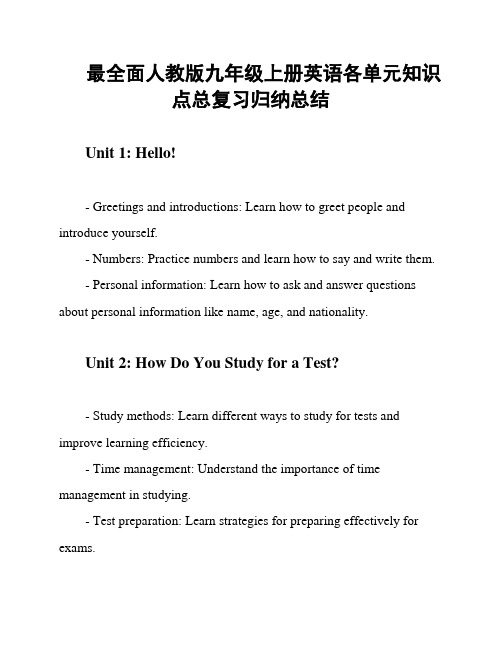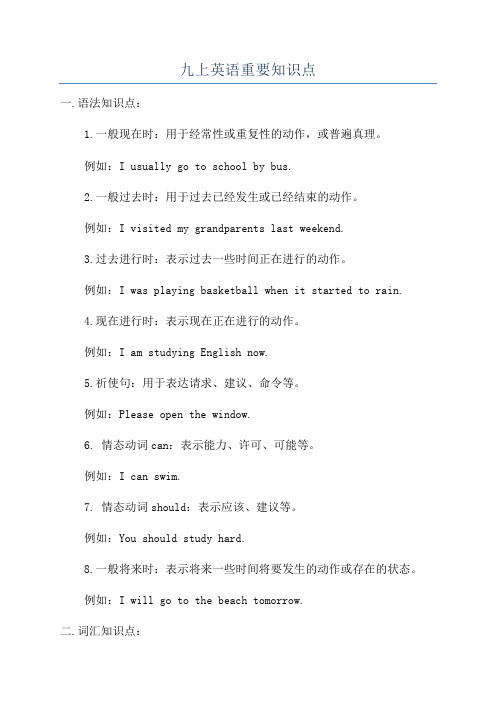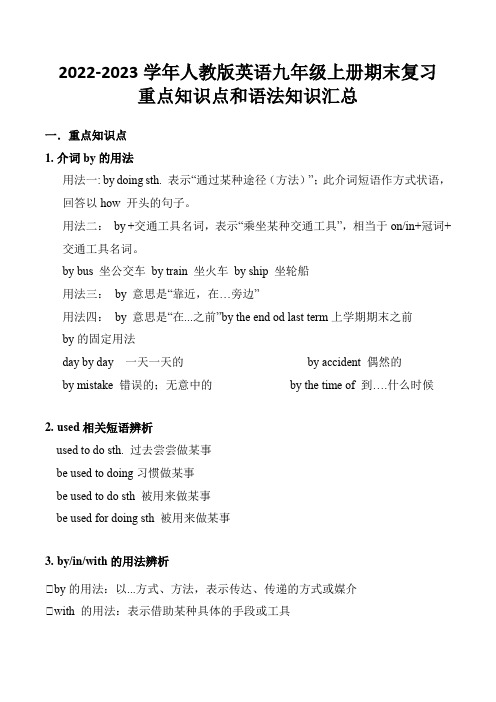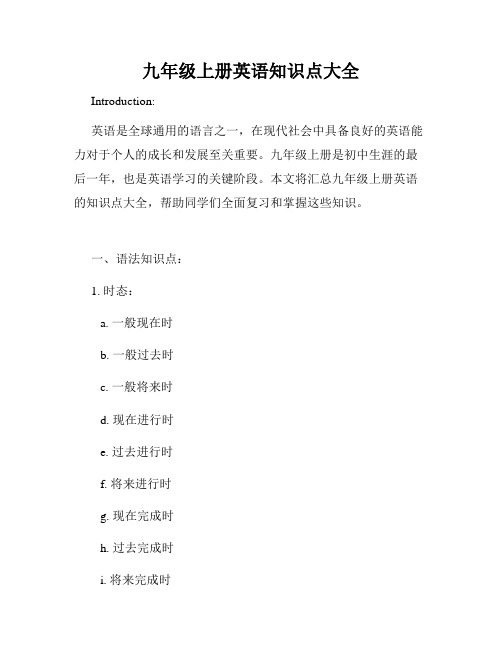九年级上册英语复习资料
- 格式:doc
- 大小:68.00 KB
- 文档页数:18

九年级上册英语知识点归纳在九年级上册的英语学习中,我们学习了许多重要的知识点,涵盖了语法、词汇、听力、口语和阅读等方面。
下面,我将对这些知识点进行归纳和总结,以便帮助大家更好地复习和掌握英语知识。
一、语法知识点1. 一般现在时:用于表达经常性的动作或状态,主语为第三人称单数时,动词要加-s或-es。
例句:He goes to school every day.2. 一般过去时:用于表达过去发生的动作或状态,动词需要变为过去式。
例句:I saw a movie last night.3. 现在进行时:用于表达正在进行的动作,动词要加-ing。
例句:She is reading a book now.4. 一般将来时:用于表达将来要发生的动作或状态,通常使用助动词will。
例句:I will visit my grandparents tomorrow.5. 祈使句:用于表达请求、建议、命令等,动词原形直接作为句子的谓语。
例句:Don't be late for school.6. 情态动词:用于表示能力、推测、许可、可能性等,如can、may、must、should等。
例句:You must finish your homework.7. 定语从句:用于修饰名词的从句,常用关系代词who、which、that引导。
例句:The girl who is talking to Tom is my sister.二、词汇知识点1. 同义词与反义词:同义词是指意义相同或相近的词语,能够丰富语言表达。
例如:happy与glad、big与large等。
反义词是指意义相反的词语,常用于对比和强调。
例如:hot与cold、fast与slow等。
2. 常用短语和习惯用语:短语和习惯用语在口语和书面语中经常使用,能够提高语言的地道性。
例如:thank you、how are you、in the end等。
3. 重要的动词和形容词:掌握常用的动词和形容词,能够帮助我们进行正确的句子构建和语言运用。

九年级英语期末复习资料班级____________ 小组____________ 姓名____________ 评价____________第一课时(词汇)I. 用括号内所给单词的适当形式填空。
1. The books on those _____(shelf)are very interesting。
2. Mike draws ______ (well) in our class。
3. My friend always talks to others ______ (polite).4. Have you found your ______ (lose) car?5. Jim writes more _______ (care) than Kate and Lily.6. I hear the Greens live on the _______ (nine) floor of this ______(build)。
7. I think this CD player is ________(help) to learn English.8。
Which do you think is more difficult, ____________ (write)English or spoken English? 9。
His _________ (miss) books are usually returned to the library。
10。
Have you ever spoken to a _________ (foreign)?11。
In the library there are lots of books on _____(difference) subjects.12。
In the end,the young man came up with a _____(wonder)idea。
13。

九年级上册英语期末复习——词汇、语法与句型一、根据中文或首字母提示完成下列单词的拼写,使句意完整与正确。
1.I'm so lucky to have James and Dave as my (搭档).2.She looked at me (用) a very strange expression.3.You’ll have to be (有耐心的) and wait till I’m off the phone.4.John k the secret from his parents.5.His p is poor. I can’t understand his words.6.Have you ever read (小说) written by Jane Austen?7.My dog usually barks when it sees a (陌生人) walk past.8.He led the child into the (温暖) of the house.9.Lily d up as a lovely cat at the party yesterday.10.It’s a secret between you and me. Don’t spread it a .11.Look! There are two new (书店) across the street.12.I live (在……附近)the park.13.This is the (中心的)city of the area.14.He needs money,so his mother s selling her house.15.Dan found work on one of the farms n .So he can walk to work every day.16.Not all (陌生者) are dangerous. We may try to trust some of them.17.Could you get an (介绍) to your friend?18.The (普遍的) opinion is that the meeting was a success.19.Real Madrid s four goals in the European Cup Final.20.I know e when the train will arrive.21.He took a pair of (剪刀) and cut her hair.22.When the leaves of the tea plant are ready, they are picked (用)hand and then are sent for processing.23.She's a (有朝气的,爱的) girl and popular with everyone.24.He l the candles on the birthday cake and made a wish.25.China's hot words,like tuhao,dama and lianghui,are w used in the Western media(媒体).26.The two policemen are (英雄).They saved two children in the river last night.27.(没有) doubt,the earth travels around the sun.28.Computers are very important in our (日常的)life.29.—The cake s good!—Thank you. Do you want some?30.It's n twelve o'clock at noon.I have to go back for lunch.31.Those (产品) are made in China.32.Children should keep away (从) junk food.33.Tom is an (很坏的)child.Everyone hates him.34.As we know,s is a bad habit.You should give it up.35.This was b done.Our teacher was angry.36.There used to be many (狼),but only a few of them remain today. 37.The policeman is running (在……后面) a thief.38.Mr.Brown would like to give all his money to (医学的) research. 39.Many sportsmen from all over the world a the 2018 Pyeongchang(平昌) Winter Olympics in Korea.40.The sun shines d into the center of the stones on midsummer's morning. 41.The (导演)who came to our city are famous. 42.What did you do (在……期间)your winter holidays?43.You should find some (空闲的)time to spend with your children. 44.Mr. Smith p Tom for his honesty and kindness yesterday.45.He doesn't talk about himself,e to his students.二、用所给词的正确形式填空。

九年级上册英语复习知识点九年级上册英语复习知识1一.归纳1.apairof一对,一双,一副2.betweenAandB在a和b之间3.onone’s/thewayto在去……的路上4.pardonme什么,请再说一遍passby路过经过lookforwardto盼望期待7.excuseme打扰了请原谅getsomemagazines得到一些杂志getsomeinformationabout获取有关……的一些信息10.turnleft\right向左\向右转11.gopast经过路过12.alittleearlier早一点儿13.agoodplacetoeat一个吃饭的好地方14.indifferentsituation在不同的情况下15.ontime准时按时16.getto到达17.havedinner吃晚餐20.theshoppingcenter购物中心21.thecornerof的角落/拐角处22.leadinto导入引入二.用法集萃1.not……·until……直到……猜……Youneverknowuntilyoutrysomething.2.let’sdosth咱们做某事吧!3.spendtimedoingsth话费时间做某事4.thanksbfordoingsth为做某事而感谢某5.wouldliketodosth想要做某事lookforwardtodoingsth盼望做某事Itseems(that)…Itseemsarockbandplaysthereeveryevening.Couldyoupleasetellme...?Couldyoupleasetellmehowtogettothepostoffice?9.take的用法①takesomefoodtakesomemedicine(=have吃,喝)②takenotes做笔记③takeone’stemperature(测量)④Ittakessbsometime/moneytodosomething(花费,需要)⑤I’lltakethiscoat.(=buy购买)⑥takesomebody/somethingto(带领,拿去,取)⑦takeatraintoChongqing(乘坐)⑧takeoff(脱下)10.turn的用法turntopage80翻到Itisyourturn.轮到你了。

九年级英语上册笔记知识点一、Unit 1 How can we become good learners?1. 重点单词。
- aloud:出声地;大声地。
例如:read aloud大声朗读。
- pronunciation:发音;读音。
注意其动词形式是pronounce。
- patient:有耐心的;n.病人。
be patient with sb.对某人有耐心。
- discover:发现;发觉。
强调发现原本存在但不为人知的事物。
- secret:n.秘密;秘诀;adj.秘密的。
the secret to………的秘诀。
2. 重点短语。
- by working with friends通过和朋友一起学习。
by+doing表示“通过某种方式”。
- make word cards制作单词卡片。
- listen to tapes听磁带。
- ask the teacher for help向老师求助。
- read aloud to practice pronunciation大声朗读来练习发音。
3. 重点句型。
- How do you study for a test?你是如何为考试而学习的?- I study by making flashcards.我通过制作抽认卡来学习。
- The more you read, the faster you'll be.你读得越多,你(阅读速度)就会越快。
(“the+比较级,the+比较级”结构,表示“越……,就越……”)4. 语法知识点。
- by的用法:- 表示方式、方法,意为“通过……;靠……;用……”,后接名词、代词或动名词。
例如:He makes a living by selling newspapers.他通过卖报纸为生。
- 表示时间,意为“到……为止;不迟于”,常与完成时连用。
例如:By the end of last month, we had learned 2000 English words.到上个月末为止,我们已经学了2000个英语单词。

九年级上册Unit1 Topic1Section A1. 复习时态1). 现在进行时: be(are/am/is)+Ving sth.2). 过去进行时:be(was/were)+Ving sth.3). 一般将来时:will/shall+do sth. /be going to do sth. (won’t)4). 一般现在时:主语+动词(v+s/es)+宾语(don’t/doesn’t)5). 一般过去时:主语+动词(v+ed)+宾语(wasn’t/weren’t/didn’t)6). 现在完成时:助动词have/has+ 过去分词(v+ed)(haven’t/hasn’t) 定义:表示动作已经完成,对现在产生影响或结果。
不能与表示过去的时间状语连用,一般与副词already (已经)、ever(曾经)、never(从不)、just(刚刚)、before (以前)、yet(还)、once/twice/three times(一次/两次/三次)、for+一段时间(为多久)、since+一个时间点(自从)等连用。
2.take (过去式)took(过去分词)takengo (过去式)went(过去分词)gonecome (过去式)came(过去分词)come become (过去式)became(过去分词)becomesee (过去式)saw(过去分词)seenbe(am/is) (过去式)was(过去分词)been be(are)(过去式)were(过去分词)been3. have/has been to… 曾经去过,(强调人已回来)。
have/has gone to…人去了,还没回(强调人不在说话的现场)。
4. be happy/glad to do sth. 开心做某事5. come back from…从……返回6. take place 发生7. more and more 越来越…(可接名词或多音节形容词)8. so+形容词/副词+that+句子如此…以至于…such+(a/an)+形容词+名词+that+句子如此…以至于…too+形容词/副词+to+V原太…以至于不能…so that+句子in order to +V原为了、以便特殊情况:名词前如果出现many/much/little/few 时要用so Eg: so many people/apples so much food/money9. take photos 照相10. improve your English 提高英语水平11. by the way 顺便说一下on the way to在去…的路上in the way挡路out of the way 偏远的12. have/catch a cold 患感冒13. How was your trip? 你的旅行怎么样?14. Great changes have taken place there. 在那儿发生了巨大的变化。

九年级上册英语知识点汇总本文将汇总九年级上册英语的知识点,方便同学们进行学习和复习。
以下是各个模块的知识点总结:一、语法知识1. 一般现在时:表示经常性的动作、习惯或客观事实。
2. 一般过去时:表示过去发生的动作或状态。
3. 现在进行时:表示现在正在进行的动作。
4. 过去进行时:表示过去某个时刻或一段时间内正在进行的动作。
5. 一般将来时:表示将来发生的动作或状态。
6. 情态动词:表示能力、可能性、许可、意愿等。
7. 被动语态:表示动作的接受者重要于执行者。
8. 直接引语和间接引语:转述别人说过的话。
9. 名词性从句:用作主语、宾语、表语或同位语的从句。
10. 定语从句:修饰名词或代词的从句。
二、词汇知识1. 动词短语:由动词和副词或介词组成的短语。
2. 名词性短语:由名词、代词或动名词构成的短语。
3. 形容词性短语:由形容词或副词构成的短语。
4. 副词性短语:由副词构成的短语。
5. 介词短语:由介词和名词、代词或动名词构成的短语。
6. 连词短语:由连词构成的短语。
三、听力技巧1. 根据听到的对话内容选择正确的答案。
2. 根据听到的问题选择正确的答案。
3. 根据听到的对话或独白填写所缺的信息。
四、阅读技巧1. 根据短文内容选择正确的答案。
2. 根据短文内容判断句子正误。
3. 根据短文填写所缺的词语。
4. 根据短文回答问题。
五、写作技巧1. 根据给定的提示写一篇短文。
2. 根据给定的图片写一篇短文。
3. 根据所给的问句写一篇短文。
六、口语表达1. 日常生活用语:问候、道谢、邀请、购物等。
2. 交通、饮食、购物、旅行等场景中的口语表达。
3. 描述人物或事物的外貌、性格、习惯等。
七、阅读理解1. 根据短文内容选择正确的答案。
2. 根据短文内容判断句子正误。
3. 根据短文填写所缺的词语。
4. 根据短文回答问题。
八、短语和固定搭配1. 动词短语:例如:break up, carry out, put off等。

最全面人教版九年级上册英语各单元知识点总复习归纳总结Unit 1: Hello!- Greetings and introductions: Learn how to greet people and introduce yourself.- Numbers: Practice numbers and learn how to say and write them.- Personal information: Learn how to ask and answer questions about personal information like name, age, and nationality.Unit 2: How Do You Study for a Test?- Study methods: Learn different ways to study for tests and improve learning efficiency.- Time management: Understand the importance of time management in studying.- Test preparation: Learn strategies for preparing effectively for exams.- Giving advice: Practice giving and receiving study advice using modal verbs.Unit 3: What Are You Doing for Vacation?- Vacation plans: Learn how to talk about your plans for the vacation.- Leisure activities: Discuss different leisure activities and preferences.- Present continuous tense: Understand and use the present continuous tense to talk about present actions.- Future plans: Express future plans and intentions using "be going to" and present continuous tense.Unit 4: I Used to Be Afraid of the Dark.- Past experiences: Learn how to talk about past experiences using "used to" and simple past tense.- Phobias and fears: Discuss different phobias and fears people may have.- Narrative tenses: Understand and use narrative tenses to talk about past events.Unit 5: What is the highest mountain in the world?- Geography and landmarks: Learn about different geographical features and famous landmarks.- Describing places: Practice describing different places using adjectives.- Research skills: Learn how to conduct research and gather information about different topics.Unit 6: Why don't you get her a scarf?- Giving suggestions: Practice suggesting and responding to suggestions.- Gift ideas: Discuss different gift ideas for various occasions.- Buying clothes: Learn how to describe and buy clothes in a store.- Preferences: Express personal preferences and opinions using adjectives.Unit 7: Teenagers should be allowed to choose their own clothes.- Rules and regulations: Discuss rules and regulations for teenagers.- Arguments for and against: Present arguments for and against a given topic.- Writing an opinion article: Learn how to write an opinion article expressing personal views.- Persuasive language: Use persuasive language to convince others of a certain viewpoint.Unit 8: I'll help clean up the city parks.- Volunteering: Discuss different volunteer activities and their benefits.- Environmental issues: Learn about environmental problems and ways to address them.- Expressing willingness: Use "will" and "be willing to" to express willingness to help.- Making suggestions: Practice making suggestions on how to improve the environment.Unit 9: What does he look like?- Physical appearance: Learn vocabulary to describe people's physical appearance.- Personality traits: Discuss different personality traits and their impact on people's lives.- Describing people: Practice describing people using adjectives and sentence structures.- Role plays: Act out different scenarios and describe the characters involved.以上是最全面人教版九年级上册英语各单元知识点的总复习归纳总结。

苏教版九年级上册英语语法复习要点九年级上册英语语法复要点一、时态复1.一般现在时概念:经常、反复发生的动作或行为及现在的某种状况。
时间状语:always。
usually。
often。
sometimes。
every week (day。
year。
month…)。
once a week,on Sundays。
etc.基本结构:①be动词;②行为动词否定形式:①am/is/are+not;②此时态的谓语动词若为行为动词,则在其前加don’t,如主语为第三人称单数,则用doesn’t,同时还原行为动词。
一般疑问句:①把be动词放于句首;②用助动词do提问,如主语为第三人称单数,则用does,同时还原行为动词。
2.一般过去时概念:过去某个时间里发生的动作或状态;过去惯性、经常性的动作、行为。
时间状语:… ago。
yesterday。
the day before yesterday。
last week(year。
night。
month…)。
in1989.just now。
at the age of 5.one day。
long long ago。
once upon a time。
etc.基本结构:①be动词;②行为动词否定形式:①was/were +not;②在行为动词前加didn't,同时还原行为动词。
一般疑问句:①was或were放于句首;②用助动词do的过去式did提问,同时还原行为动词。
3.目前举行时观点:透露表现现阶段或语言时正在举行的举措及行为。
时间状语:now。
at this time。
these days。
etc.基本结构:am/is/are + doing否定方式:am/is/are + not + doing.一般疑问句:把be动词放于句首。
4.过去进行时概念:表示过去某段时间或某一时刻正在发生或进行的行为或动作。
时间状语:XXX。
XXX或以when指导的谓语动词是一般曩昔时的时间状语等。

九上英语重要知识点一.语法知识点:1.一般现在时:用于经常性或重复性的动作,或普遍真理。
例如:I usually go to school by bus.2.一般过去时:用于过去已经发生或已经结束的动作。
例如:I visited my grandparents last weekend.3.过去进行时:表示过去一些时间正在进行的动作。
例如:I was playing basketball when it started to rain.4.现在进行时:表示现在正在进行的动作。
例如:I am studying English now.5.祈使句:用于表达请求、建议、命令等。
例如:Please open the window.6. 情态动词can:表示能力、许可、可能等。
例如:I can swim.7. 情态动词should:表示应该、建议等。
例如:You should study hard.8.一般将来时:表示将来一些时间将要发生的动作或存在的状态。
例如:I will go to the beach tomorrow.二.词汇知识点:1.表示时间的词汇:- 年份:year- 月份:month- 星期:week- 天:day- 小时:hour- 分钟:minute- 秒:second- 早上:morning- 下午:afternoon- 晚上:evening 2.表示地点的词汇:- 学校:school- 家:home- 父母:parents- 公园:park- 图书馆:library- 商店:shop- 医院:hospital- 银行:bank- 餐厅:restaurant3.表示动作的词汇:- 看:look- 听:listen- 说:speak- 写:write- 读:read- 唱:sing- 跳:jump- 跑:run- 游泳:swim- 踢足球:play football 4.表示食物的词汇:- 苹果:apple- 鸡蛋:egg- 面包:bread- 牛奶:milk- 汉堡包:hamburger- 薯条:fries5.表示动物的词汇:- 猫:cat- 狗:dog- 鸟:bird- 鱼:fish- 熊:bear- 老虎:tiger- 狮子:lion- 大象:elephant三.句型知识点:1.对话句型:- How are you?:你好吗?- I'm fine, thank you.:我很好,谢谢。

九年级英语上册第 1-5 单元复习要点一、短语。
1. by making flashcards 通过做单词抽认卡2. askfor help 向某人求助3. read aloud 朗读4. that way (=in that way) 通过那种方式5. improve my speaking skills 提高我的会话技巧6. for example 例如?7. have fun doing sth 玩得高兴 conversations with friends 与朋友对话 9. get excited about 为 高兴,激动 up speaking in Chinese 以说汉语结束对话a survey about做 有关 的调查an English notebook 记英语笔记 English (= oral English) 英语口语 mistakes in sth 在犯错误the pronunciation right 使发音准确speaking English 练习说英语?of all 首先 with 以 开始on 随后?class 在课堂上 at 嘲笑notes 记笔记?doing 喜欢干down 写下,记下 up (v + adv) 查找,查询 speakers 说本族话的人 up 编造,虚构,化妆,打扮 the world 全世界with 对待,处理,解决 about (be worried about) 担心,担忧angry with 生某人的气 angry 生气by 消逝? 34. regardas 把 当做about/of 抱怨? 36. with the help of 在 的帮助下 to (with)把 和 作比较?of (think about) 想起,想到 at all 根本不,全然不 problems 身体上的问题 off 中断,突然终止?complete sentences 做完整的句子?加入某团体并成为其中一员;join in 与 take part in 指参加到某项活动中去。

九年级英语上学期复习资料整理
一、词汇复
- 复并掌握九年级上册的主要单词和短语,特别是重要的动词和形容词。
二、语法复
- 复并掌握九年级上学期的主要语法知识,包括句子结构、时态、语态、名词性从句、定语从句等。
三、阅读理解
- 阅读并理解九年级上学期的课文和相关阅读材料,注意把握文章的主旨、细节和逻辑关系,提高阅读理解能力。
四、写作技巧
- 复并掌握九年级上学期的写作技巧,包括句子结构、连词的使用、段落组织等。
五、口语表达
- 练口头表达能力,进行口语对话练,扩展词汇量,并锻炼流利、准确的口语表达能力。
六、听力训练
- 进行听力练,提高听力理解能力,注意抓住关键信息和上下文的逻辑关系。
七、自主研究
- 多阅读英语原版书籍、报纸、杂志等,培养独立研究的惯,提高英语综合能力。
八、练题
- 注重做一些与九年级上学期知识相关的练题,巩固复所学的知识。
以上是九年级英语上学期复的一些资料整理建议,希望能对你的研究有所帮助。

九年级英语上册课本重点知识复习九年级英语上期期末复习(Unit1-12)Unit11.He studies by asking the teacher for helpby以…方式,靠+n/doing I went to school by bus/train/subway/bike/plane /boat….2.the best way to do sth做某事的最好方法3.Joining the English club was the best way to improve our English.动名词作主语+V三单4.have trouble/problem/difficult/a hard time+doing sth做某事很困难ugh at sb.嘲笑某人st(持续)+一段时间The rain lasted for6hours yesterday.7.regard…..as……=consider….as…..=treat……as…….把…..当成……plain to sb about doing sth抱怨某人做某事9.except/besidesexcept除…以外….All the students went to the zoo except mebesides除….以外(包括在内)I have few friends besides you.10.as soon as….一….就……(条件状语从句,主将从现)I’ll call you as soon as I get there.11.if引导宾语从句时“是否”if引导条件状语从句“假如,如果”,主句为将来时,从句用一般现在时。
I don’t know if it will rain,if it rains,I won’t go out.宾从条从Unit21.1)used to do sth过去常常做某事He used to do homework until10pm.2)be used to doing sth习惯于做某事I’m used to getting up early.She is used to living alone.3)be used to do sth=be used for doing sth被用于做某事Knife is used to cut things =Knife is used for cutting things.2.afford买得起,负担得起(…的费用)I can’t afford a new car.afford to do sth负担得起做某事3.get in trouble with与….发生纠纷be patient with sb of sth在某事上对某人很耐心4.be proud of=take pride in+n/doing对…..感到骄傲5.It‘s time(for sb)to do sth/It’s time for sth是(某人)该做某事的时候了t t , Unit 31. be allowed to do sth 被允许做某事 allow sb to do sth 允许某人做某事 allow to do sth 允许做某事2. (1) instead of + n /pre / vingShe prefers milk instead of (=rather than) coffee. We’d like to go sightseeing instead of staying at home.(2) instead 相反的、代替。

九年级上册英语复习资料九年级英语Unit11. by + doing 通过……方式如:by studying with a groupby 还可以表示:“在…旁”、“靠近”、“在…期间”、“用、”“经过”、“乘车”等如:I live by the river. I have to go back by ten o’clock.The thief entered the room by the window.The student went to park by bus.2. talk about 谈论,议论,讨论如:The students often talk about movie after class. 学生们常常在课后讨论电影。
talk to sb. === talk with sb. 与某人说话3. 提建议的句子:①What/ how about +doing sth.?如:What/ How about going shopping?②Why don’t you + do sth.? 如:Why don’t you go shopping?③Why not + do sth. ? 如:Why not go shopping?④Let’s + do sth. 如:Let’s go shopping⑤Shall we/ I + do sth.? 如:Shall we/ I go shopping?4. a lot 许多常用于句末如:I eat a lot. 我吃了许多。
5. too…to 太…而不能常用的句型too+adj./adv. + to do sth.如:I’m too tired to say anything. 我太累了,什么都不想说。
6. aloud, loud与loudly的用法三个词都与"大声"或"响亮"有关。
①aloud是副词,重点在出声能让人听见,但声音不一定很大,常用在读书或说话上。

九年级上册英语复习资料九年级英语Unit11. 提建议的句子:①What/ how about +doing sth.? ②Why don’t you + do sth.?③Why not + do sth. ? ④Let’s + do sth. ⑤Shall we/ I + do sth.?2. too…to 太…而不能常用的句型too+adj./adv. + to do sthSo…to 如此…以至于not …at all 一点也不根本不3. by + doing 通过……方式如:by studying with a groupby 还可以表示:“在…旁”、“靠近”、“在…期间”、“用、”“经过”、“乘车”等4talk about 谈论,议论,讨论talk to sb. =talk with sb. 与某人说话5laugh at sb. 笑话;取笑(某人)enjoy doing sth . 喜欢做…乐意做…enjoy oneself 过得愉快6 one of +(the+ 形容词比较级)+名词复数形式…其中之一7.be / get excited about sth.= be / get excited about doing sth. =be excited to do sth. 对…感兴奋8 first of all 首先to begin with 一开始later on 后来、随also 也、而且(用于肯定句)常在句子的中间either 也(用于否定句)常在句末too 也(用于肯定句) 常在句末make mistakes 犯错make up 组成、构成9see sb. / sth. do 看见某人(经常)做某事see sb. / sth. doing 看见某人正在做某事强调正在发生10.too many许多修饰可数名词too much许多修饰不可数名词much too太修饰形容词10. It’s +形容词+(for sb. ) to do sth. (对于某人来说)做某事…句中的it 是形式主语,真正的主语是to study English11.deal with =do with 处理12 .compare …to …把…与…相比九年级英语Unit21 interesting adj.有趣的,指某事物/某人具有趣味,主语往往是物interested adj. 感兴趣的,指人对某事物感兴趣,往往主语是人be interested in (doing )sth. 对(做)…感兴趣2. used to do sth. 过去常常做某事否定形式:didn’t use to do sth. / used not to do sth.3反意疑问句①肯定陈述句+否定提问②否定陈述句+肯定提问④陈述句中含有否定意义的词,如:little, few, never, nothing, hardly,nobody等。

Topic 2一. 重点词语1.by the way 顺便说一下2.depend on取决于……;依靠……3.be different from与……不同4.succeed in成功,达成5.make yourself understood表达你自己的意思6.on one’s way to 在某人去……的路上7.see sb. Off给……送行8.leave for…前往某地/leave…for…离开…去…9.in twenty minutes二十分钟之后10.written English笔头英语/oral English英语口语11.generally speaking一般说来,大致上说12.as for sb./sth.至于某人/某物13.be close to…靠近……14.in person身体上,外貌上;亲自15.be found of…爱好……16.be forced to do sth.被迫做……/force sb.to do强迫某人做某事17.even worse 更糟的是二.重点句型1. Is Australia English the same as British English 澳式英语和英式英语一样吗2.English is spoken differently in different English-speaking countries.不同的国家使用不同的英语。
3. For example, there are differences between British English and American English.例如,在英式英语和美式英语之间有些不同点。
4I can’t believe that I’m flying to Disneyland.我简直不敢相信我就要飞往迪斯尼乐园了。
5.I hope I won’t have any difficulty.我希望不会遇到什么困难。

初三英语上册知识归纳
1. 词汇:
扩大词汇量:学习并掌握课本中的新词汇,同时通过阅读、听力等方式增加课外词汇量。
词性理解:理解并掌握名词、动词、形容词、副词等词性的基本概念和用法。
同义词和反义词:学习并掌握一些常用词汇的同义词和反义词,丰富语言表达。
2. 语法:
时态:学习并掌握一般现在时、一般过去时、一般将来时、现在进行时、过去进行时、现在完成时等时态的基本概念和用法。
语态:了解并掌握主动语态和被动语态的区别和用法。
直接引语和间接引语:学习如何将直接引语转换为间接引语,反之亦然。
定语从句和名词性从句:了解并掌握定语从句和名词性从句的基本结构和用法。
3. 句型:
简单句、并列句和复合句:了解并掌握这三种句型的基本结构和用法,能够识别并运用它们进行表达。
强调句和倒装句:学习并掌握强调句和倒装句的基本用法,丰富句型变化。
4. 阅读理解:
提高阅读速度:通过大量阅读,提高阅读速度和理解能力。
理解文章结构:学会分析文章的结构,找出主题句和关键信息。
猜测词义:学会通过上下文猜测生词的意思,提高阅读理解能力。
5. 写作:
写作技巧:学习并掌握一些基本的写作技巧,如分段、使用过渡词等。
写作练习:通过写作练习,提高写作能力,学会用英语表达自己的观点和想法。

九年级英语重点短语单词复习Unit 1一.词组。
1.通过做单词抽认卡2.向某人求助3.朗读4.通过那种方式5.提高我的会话技巧6.例如7.玩得高兴8.与朋友对话9.为…高兴,激动10.以说汉语结束对话11.做有关…的调查12.记英语笔记13.英语口语14.在…犯错误15.使发音准确16. 练习说英语17.首先18.以…开始19.随后20.在课堂上21.嘲笑22.记笔记23.喜欢干…24.写下,记下25.查找,查询26.说本族话的人27.编造,虚构,化妆,打扮28.全世界29.对待,处理,解决30.担心,担忧31.生某人的气32.生气33.消逝34.把…当做…35.抱怨36.在…的帮助下37. 把…和…作比较38.想起,想到39.身体上的问题40.中断,突然终止41.根本不,全然不42.做完整的句子43.参加到某项活动中去。
44.害怕45.做....有困难46.为考试用功47.做单词表48.太…而以致于不能49. 看英语电视50.首先51.记大量的语法笔记52.查字(词)典53.这种纸54.在…上花费(时间、金钱)55.把英语当做第二语言来说56.放弃57.在将来二.单词拼写。
1. What about _____( go ) there on Sunday?2. ---How old are you? ---It’s a s__________.3. He made a lot of spelling m_______ in the test, so he failed.4. She t________ lots of notes to improve her Chinese last term.5. Please make u_______ conversations with your group.6. The boy can’t deal with the problem ________ (容易).7. Sometimes, people can stay ________ (生气) for years about a small problem.8. Watching English movies can help us i ___ our listening skills.9. If you practice ________ (读) French every day, you will improve it quickly.10. Please read it more _________ (慢)so that the others can understand it better.11. Reading a__________ is a good habit.12. Can you tell me how to d__________ with this difficult problem?13. We always join an English club to p__________ speaking English.14. The _______( good ) way to learn English is to use it.15. We speak English as a second l__________.16. I hear this dictionary is very ________( help ) for us students.17. Maybe we couldn’t always make c__________ sentences.18. It’s impolite to laugh at the people when they are in t__________.Unit 2一.词组。

2022-2023学年人教版英语九年级上册期末复习重点知识点和语法知识汇总一.重点知识点1.介词by的用法用法一: by doing sth. 表示“通过某种途径(方法)”;此介词短语作方式状语,回答以how 开头的句子。
用法二:by +交通工具名词,表示“乘坐某种交通工具”,相当于on/in+冠词+交通工具名词。
by bus 坐公交车by train 坐火车by ship 坐轮船用法三:by 意思是“靠近,在…旁边”用法四:by 意思是“在...之前”by the end od last term上学期期末之前by的固定用法day by day 一天一天的by accident 偶然的by mistake 错误的;无意中的by the time of 到….什么时候ed相关短语辨析used to do sth. 过去尝尝做某事be used to doing习惯做某事be used to do sth 被用来做某事be used for doing sth 被用来做某事3.by/in/with的用法辨析①by的用法:以...方式、方法,表示传达、传递的方式或媒介①with 的用法:表示借助某种具体的手段或工具(1) with +工具(2)with+人体部位①in 的用法:通常与“衣着、声音、书写材料”等名称连用in+语言in English 用英语4.since与for在现在完成时态中的用法①since 其后接时间点或时态为一般过去时的句子,表示某事是从什么时候开始的①for其后接时间段,表示某事持续了多长时间5.has gone (to); has been (to); has been (in) 三者的辨析①has gone to:表示某人已去了某地,(未回来)①has been to:表示去过某地,(已回来)①has been in:表示一直呆在某地,常与时间段搭配。
6.the number of/a number of 的辨析①the number of意为“...数量”,后接名词复数,作主语时,谓语动词用单数。

九年级上册英语知识点大全Introduction:英语是全球通用的语言之一,在现代社会中具备良好的英语能力对于个人的成长和发展至关重要。
九年级上册是初中生涯的最后一年,也是英语学习的关键阶段。
本文将汇总九年级上册英语的知识点大全,帮助同学们全面复习和掌握这些知识。
一、语法知识点:1. 时态:a. 一般现在时b. 一般过去时c. 一般将来时d. 现在进行时e. 过去进行时f. 将来进行时g. 现在完成时h. 过去完成时i. 将来完成时2. 从句的用法:a. 定义性从句b. 地点状语从句c. 原因状语从句d. 结果状语从句e. 条件状语从句f. 时间状语从句g. 目的状语从句h. 让步状语从句i. 方式状语从句3. 被动语态的构成和用法:a. 一般现在时的被动语态b. 一般过去时的被动语态c. 一般将来时的被动语态d. 现在进行时的被动语态e. 过去进行时的被动语态f. 现在完成时的被动语态g. 过去完成时的被动语态4. 介词的用法:a. 介词与名词搭配b. 介词与动词搭配c. 介词与形容词搭配d. 介词短语的用法及固定搭配二、词汇知识点:1. 同义词与反义词:a. 形容词、名词、动词的同义词与反义词b. 副词的同义词与反义词c. 介词与介词短语的同义词与反义词2. 词性转换:a. 动词转换成名词b. 名词转换成形容词c. 形容词转换成副词d. 副词转换成形容词e. 形容词转换成动词3. 高频词汇:a. 频率副词b. 数词c. 天气词汇d. 动作词汇e. 食物词汇f. 家庭成员词汇g. 爱好和活动词汇h. 学科词汇三、阅读技巧:1. 主旨大意题的解题技巧2. 推理判断题的解题技巧3. 细节理解题的解题技巧4. 排序归纳题的解题技巧5. 词义猜测题的解题技巧四、写作技巧:1. 日记的写作技巧2. 书信的写作技巧3. 邀请函和感谢信的写作技巧4. 描写人物和事物的技巧5. 议论文的写作技巧五、听力技巧:1. 听录音,提高听力理解力2. 记笔记,提取关键信息3. 多做听力练习,熟悉不同题型4. 注意听力材料的语速和语调5. 多与他人进行英语对话,增强口语听力能力结论:九年级上册英语知识点涵盖了语法、词汇、阅读、写作和听力技巧等方面。
Topic 2一. 重点词语1.by the way 顺便说一下2.depend on取决于……;依靠……3.be different from与……不同4.succeed in 成功,达成5.make yourself understood表达你自己的意思6.on one’s way to 在某人去……的路上7.see sb. Off给……送行8.leave for…前往某地/leave…for…离开…去…9.in twenty minutes二十分钟之后10.written English笔头英语/oral English英语口语11.generally speaking一般说来,大致上说12.as for sb./sth.至于某人/某物13.be close to…靠近……14.in person身体上,外貌上;亲自15.be found of…爱好……16.be forced to do sth.被迫做……/force sb.to do强迫某人做某事17.even worse 更糟的是二.重点句型1.Is Australia English the same as BritishEnglish? 澳式英语和英式英语一样吗?2.English is spoken differently in different English-speaking countries.不同的国家使用不同的英语。
3. For example, there are differences between British English and American English.例如,在英式英语和美式英语之间有些不同点。
4 I ca n’t believe that I’m flying to Disneyland.我简直不敢相信我就要飞往迪斯尼乐园了。
5.I hope I won’t have any difficulty.我希望不会遇到什么困难。
6.Whenever you need help, send me an-mail or telephone me.无论何时你需要帮忙,给我发电子邮件或打电话。
7.Not only children but also adults enjoy spending their holidays in Disneyland.不但青少年而且成年人也喜欢到迪斯尼乐园度假。
三、语法学习用现在进行时表示将来现在进行时表示将来时,常有“意图”、“安排”(但不是固定不变的)或“打算”含义。
它表示最近或较近的将来,所用的动词多是位移动词。
如:come, go, arrive, leave, fly, start, begin, return, open, die例:I’m going.我要走了。
When are you starting?你什么时候动身?Don’t worry. Th e train is arriving here soon.别着急,火车马上就到了。
表示将来的现在进行时除了用于位移动词外,亦可用于某些非位移动词。
如:My uncle is meeting us tomorrow.我叔叔明天会见我们。
She is buying a new bike soon.她不久将买一辆新自行车。
四.交际用语:谈论不同国家英语的不同点并了解交际中的身体语言1.I can’t follow you. Can you speak more slowly, please?2.Oh, it sounds interesting.3.If you want to succeed in making yourself understood, you need to know some of these differences4.---What’s up? ---The foreigner is asking fora ride.5.Generally speaking, American English is different from British English in pronunciation and spelling.Topic 3一、重点词语1.in public在公共场所2.at times=sometimes有时3.feel like doing=would like to do想要做……4..give up sth./doing sth.放弃5..turn to sb. for help求助于某人6..give sb. some advice on/about…给某人一些有关……的建议7..be weak in在……方面很差/be good at在……方面很好8..be afraid of doing sth.害怕做某事9.make mistakes犯错误10.take a deep breath深呼吸11.the best time to do做某事最好的时间12.do some listening practice做些听力训练13.reply to=answer回答14.advise sb. to do建议某人做某事(名词advice)二、重点句型1.Could you make yourself understood in the U.S.A?在美国,别人能懂得你的话吗?2.I don’t know what to do.我不知道该怎么办?3.At times I feel like giving up.有时我想要放弃。
4.Try to guess the meanings of the new words, and get the main idea of the article.尽量猜测生词的意思,理解文章的大意。
5.I dare not answer questions in class, because I’m afraid of making mistakes.我不敢在课堂上回答问题,困为我害怕犯错误。
6.It’s an honor to talk with all of you.与在座的各位交谈是我的荣幸。
7.But remember to choose the ones that fit you best.但是记住要选择最适合你的一种。
8.I insist that you practice English every day.我坚持认为你们每天都应该练习英语。
9.Believing in yourself is the first step on the road to success.自信是通往成功的第一步。
三、语法学习wh- +to do wh-是指when, where, which, who(m)及how等连接词,它们和动词不定式连用,即为wh- +to do 结构。
这种结构在句中常作主语、表语和宾语,作宾语时可以转换为宾语从句。
(对于谓语动词来说,wh- +to do这个不定式动词的动作是个尚未发生的动作,所以在转换成宾语从句时,通常须加情态动词或用将来时表示未来。
) 如:I don’t know what to do.=I don’t know what I should do.She can’t decide which to buy.=she can’t decide which she will buy.反之,如果主句中的主语与宾语从句中的主语一致时,宾语从句(由疑问词引导)通常可以与“疑问词+不定式”互相转换。
如:I don’t know what I should do.=I don’t know what to do.如果不一致就不能转换。
I want to know what Mary will do.(不能说:I want to know what to do.)四、交际用语:谈论如何学习英语1.---…, but I hate to speak English in public. ---You’d better not.2.---I know it’s very important to learn English well. But it’s difficult for me.---Me, too.3.Have you ever had any difficulties in studying English?4.---…, could you give us some advice on how to learn English well?---You’d better follow the tape and do some listening practice.I think the best time to remember new words is in the morning.Unit 4 Topic 1一、重点词汇:(一)词形转换:1. successful(副词)2. proper(副词)3. completely(动词)4. leader(动词)5. succeed(名词)6. hero(复数)7. physics(形容词)8. fix(同义词)9. introduce(名词)10. far(比较级)(二)重点词组:1. go around 环绕2. send…into…=send up…into…把……送入3. congratulations on sth 祝贺某事4. be proud of 为……而自豪5. be moved by 为……而感动6. Thanks/Thank you for +n./ving sth 感谢某人做的某事7. have physical examinations 做体检8. in good/bad health 处于好(不好)的身体状态9. can’t help doing 情不自禁做……10. take turn to (do sth) 轮流(做某事)11. no doubt 无疑地12. as well as 除……的之外,也13. for instance/example 例如14. work on 做……(方面)的工作15. depend on/upon 依靠,依赖16. turn on 打开17. turn off 关掉18. turn up 开大19. turn down 关小20. click on 用鼠标点击21. look forward to doing sth 期待做某事二、重点句型:1. Now big plans are being made to send up more satellites and even build a space station.现在中国正在计划发射更多的卫星,甚至建造一个空间站。